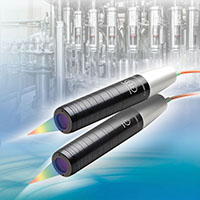High-resolution confocal sensor
05/03/2019
Precision sensor manufacturer Micro-Epsilon has extended its range of confocal chromatic displacement sensors with a new compact sensor that offers outstanding value for money and high accuracy, enabling its cost-effective use in high-volume OEM, machine building, systems integration and continuous production applications. The confocalDT IFS2406-3 confocal chromatic displacement sensor is designed for high-precision distance, position and thickness measurements. The performance of the sensor is almost as high as that of the market-leading confocal IFS2405 series, yet has a much more compact footprint. With a diameter of 19 mm, the confocalDT IFS2406-3 is easily integrated in restricted and confined spaces. Due to an offset distance of 74 mm and a measuring range of 3 mm, the sensor is particularly useful when increased process reliability and protection of the sensor and target from mechanical damage are required. Special lens technology allows the sensor to deliver a high resolution with an extremely small laser spot size (35 µm diameter).
The confocalDT IFS2406-3 confocal chromatic displacement sensor is designed for high-precision distance, position and thickness measurements. The performance of the sensor is almost as high as that of the market-leading confocal IFS2405 series, yet has a much more compact footprint. With a diameter of 19 mm, the confocalDT IFS2406-3 is easily integrated in restricted and confined spaces. Due to an offset distance of 74 mm and a measuring range of 3 mm, the sensor is particularly useful when increased process reliability and protection of the sensor and target from mechanical damage are required. Special lens technology allows the sensor to deliver a high resolution with an extremely small laser spot size (35 µm diameter).With a compact footprint and small measuring spot size, the confocalDT IFS2406-3 is said to be ideal for high-accuracy distance measurements on reflecting or transparent surfaces, as well as one-sided thickness measurements of transparent film, plates or layers.
As well as distance measurements on highly reflective, shiny surfaces, the sensor can also be used to measure dark, diffuse materials. Typical applications include displays, smartphones, mirrors and glass production and medical devices. The sensors are also suitable for vacuum applications in the production of semiconductors and microelectronics.
The confocalDT IFS2406-3 has a resolution of 50 nm and a linearity of ±1.5 µm (for distance and displacement measurements) and ±3 µm (for thickness measurements). The operating temperature range is from +5°C to +70°C and is protected to IP65.
Together with the confocal chromatic controller, confocalDT 242x, the sensor system offers an excellent price-performance ratio, particularly for OEM series production applications. The confocalDT IFS2406-3 sensor is compatible with all confocal controllers from the Micro-Epsilon range.
With the confocalDT 2421 and 2422 confocal controllers, Micro-Epsilon claim to be setting new performance standards in precision confocal measurement technology. Designed as a single- or dual-channel version, these confocal chromatic measurement systems enable a cost-effective solution for OEMs.
The system works on a non-contact basis and is therefore wear free. The active exposure control of the CCD line allows fast, accurate compensation to be achieved when measuring on different surfaces.
Measurement data can be output in real time via the EtherCAT interface. Thickness calibration allows accurate thickness measurement over the entire measuring range of the sensor.